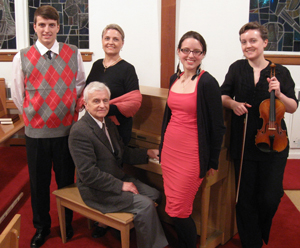by Daniel Hathaway

Youngstown composer Richard Zacharias’s All Right, Time to Go, ironically opened the evening with intriguing back-and-forth monologues between violin (Natalie Sahyoun) and piano (Alison Morris) who only later joined in dialogue. Both in the opening work and in Zacharias’s Duo Two (a first performance), the pairs of instrumentalists seemed to be trying to start up a conversation but communication proved difficult. Duo Two was distinguished by strong horn playing from Stephen Klein, with the fine assistance of pianist Maria Fesz.
Yanda Zhu was represented by two premieres — Playful Dolphins in the first half (with Christopher Nutter, clarinet and Jerry Rezanka, piano) and Cat Tango, which ended the second (with violinists Mariana Szalaj and Natalie Sayoun and pianist Alison Morris). Dolphins featured leaping, lyrical lines over colorful, Gallic harmonies. Cat Tango had something of a middle-eastern flavor, beginning more like a waltz before discovering its inner sultriness. The musicians gave strong readings, Nutter ably nailing some difficult high notes.
The talented Sobieski family contributed four pieces to Wednesday evening’s menu, including the expressive trios Laudate Dominum and later, Hymn do Matki Boskiej by Stanislaw Moniuszko (1819-1872), sung by sopranos Dorota and Aleksandra Sobieska, bass Julian Sobieski and pianist Jacek Sobieski.
Robert Rollins’s Musicians Wrestle Everywhere from his Three Songs on Poems by Emily Dickinson brought soprano Dorota Sobieska and pianist Jacek Sobieski back onstage. A rather abstract, atonal setting of Dickinson’s transcendent text, Musicians took Sobieska into the vocal stratosphere with vocalises and long chains of sospiri motifs and ended with very high tessitura, all of which she managed easily with strong support from Sobieski.
A second Rollin piece, Pearls Variations (first performance), based on a Yiddish folk tale, featured the eloquent violin soloist Ethan Howard, who introduced the narrative and was later joined by string orchestra in Celtic-flavored textures which grew more and more complex as the attractive six-minute work unfolded. The two Rollin works were separated by Boston composer Arthur Foote’s (1853-1937) Irish Folk Song, a charming trifle nicely played by the strings.
Carol Ann Smolka’s affecting work, I Am Not Dumb Now from Images of Helen Keller, receiving its first performance, drew a variety of string effects from the orchestra — pizzicatos, strong separated downstrokes and chords and violent tremolos.
Samantha Hogan’s evocative Eclectic Images was also receiving its premiere. Its four movements, Hurricane Island, Family Reunion, River Routes and Sheer Elation conjured up graphic musical scenes which ranged from ominous to jazzy and sounded appropriately meandering in the river scene.
A memorial moment followed for the late composer Tim Webb as Ethan Howard returned to play the second movement of Webb’s Samson Suite with the orchestra, a beautiful, Celtic-tinged, elegiac piece with simulations of pealing bells at the end.
Time stopped — as Messiaen would have wanted — when organist Sean Baran skillfully played the French composer’s La Verbe from La Nativité du Seigneur. The work begins with striking dissonant chords but soon devolves into a calm vision of eternity of some ten minutes’ duration.
Dorota Sobieska and Jacek Sobieski returned in the second half for three of Karol Szymanowski’s Twelve Songs from Kurpie, colorful settings of dialect poems that the couple had performed with their Opera Circle Company in Cleveland in 2007 in conjunction with Verlezza Dance. Their insightful performance was riveting and was followed by Jacek Sobieski’s dazzling account of the outrageous Toccata from the Second Piano Sonata of Grazyna Bacewicz (1909-1969), one of Poland’s groundbreaking woman composers.
Published on ClevelandClassical.com May 8, 2013
Click here for a printable version of this article.


